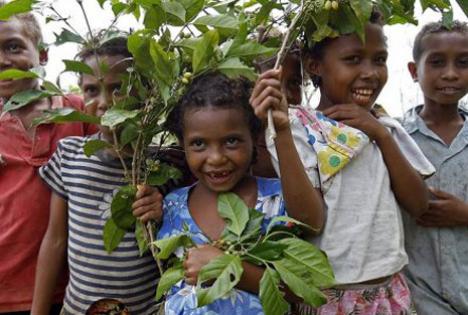Her mother, having heard that two Australian pediatric surgeons had arrived to help local doctors, brought in her child in the hope they could treat Merolyn's aggressive cancer.
The teenager suffers from Ewing's Sarcoma, a malignant bone cancer that affects children. It had caused her left forearm to swell and ulcerate.
Coming from a remote PNG village, Merolyn had been unable to access even basic pain relief such as panadol.
"The poor kid couldn't even get out of bed and walk around, she was in that much pain," recalls Dr Michael Cooper, a senior anaesthetist at the Children's Hospital at Westmead in Sydney.
"We just put her on some morphine tablets. The next day, she was sitting up in bed smiling at us, saying `I feel better'."
Dr Cooper and fellow Westmead colleague, surgeon Associate Professor Albert Shun, ended up amputating Merolyn's forearm.
But despite alleviating her pain and removing the offending limb that would have brought death sooner, Merolyn's cancer is considered terminal and she is expected to live less than a year.
She was one of dozens of sick children operated on by the Australian duo with local doctors during a two-week stint in the PNG highlands and Port Moresby this month.
The annual visit, which the pair have taken together for the past 12 years, is designed not only to help needy children but to train local surgeons and anaesthetists.
There are only 15 fully-qualified anaesthetists in PNG, with anaesthetist scientific officers or ASOs, who only receive one year's training, delivering anaesthesia in a country of about seven million people.
Without the expertise offered by Dr Cooper and Assoc Prof Shun during their yearly visit, many of the children with serious disease and abnormalities would die, contributing to the country's high child mortality rate of about 75 per 1000.
During the two week surgical tour, the team carried out 25 major and six minor operations including on two tiny, underweight newborns with severe congenital abnormalities.
The infants, who each weighed only about 2kg, suffered from bowel problems at birth.
One child's bowel had grown outside the abdomen, while the other's was pushing into the chest, squashing a lung.
Both children survived the tricky surgery, with surgeons overjoyed when one began breastfeeding.
But not all the children needing surgery can be operated on in the primitive PNG conditions.
Dr Cooper says one such child this year was a six-year-old girl with a life-threatening condition affecting veins in one of her legs.
The vein malformations had crippled her.
She was unable to straighten her leg or walk and was in agony.
Dr Cooper says the child is at risk of infection or bleeding to death when the veins rupture.
The only option in PNG is to amputate her leg, but there is a possibility a more delicate operation could be carried out in Australia, which the surgeons hope will be possible by raising funds.
The surgeons need access to scanning technology in Australia including magnetic resonance imaging (MRI) which is not available in PNG.
There are more physical challenges. Oxygen, ferried up to the highland hospitals in cylinders on the back of trucks, inevitably runs out.
"I've seen deaths in hospitals up there when the oxygen runs out," Dr Cooper says.
Blackouts occur in the middle of surgery, power generators fail to kick in or if they do, offer light but no electricity to fuel an anaesthetic monitor.
"I always carry torches in my bag so that we can at least keep going by torchlight," Dr Cooper says.
Water supplies run out, sterilisers break down, equipment stocks dry up, drugs are out of date or ineffective.
If it's not rats chewing on drug vials in the operating theatre, it's mosquitoes buzzing around the surgeons, attracted by blood.
"That's part of working in a developing country," Dr Cooper says.
"They're the challenges you don't have to worry about every day in Australia."
Although the struggling healthcare system may seem hopeless, Dr Cooper says the PNG doctors and the ASOs do the best they can in the face of extremely limited resources.
But the children are the ones in society that suffer the most, he says.
"We're always trying to be advocates for the children, saying, `look, if you fix this child, this child will have a normal life and they may be the next prime minister of PNG."
PNG CHILD HEALTH STATISTICS:
* Overall under-5 mortality rate about 75 per 1000 live births
* In rural areas, about 97 children per 1000 live births die before 5
* In rural areas, about 63 infants per 1000 live births die
* In urban areas, about 36 children per 1000 live births die before 5
* In urban areas, 29 infants per 1000 births die
* More than 15 per cent of babies born with low birth weight
* 30 per cent of children under 5 affected by malnutrition
* 87 per cent of entire population live in rural areas
Source: Unicef PNG


















__small.png)










